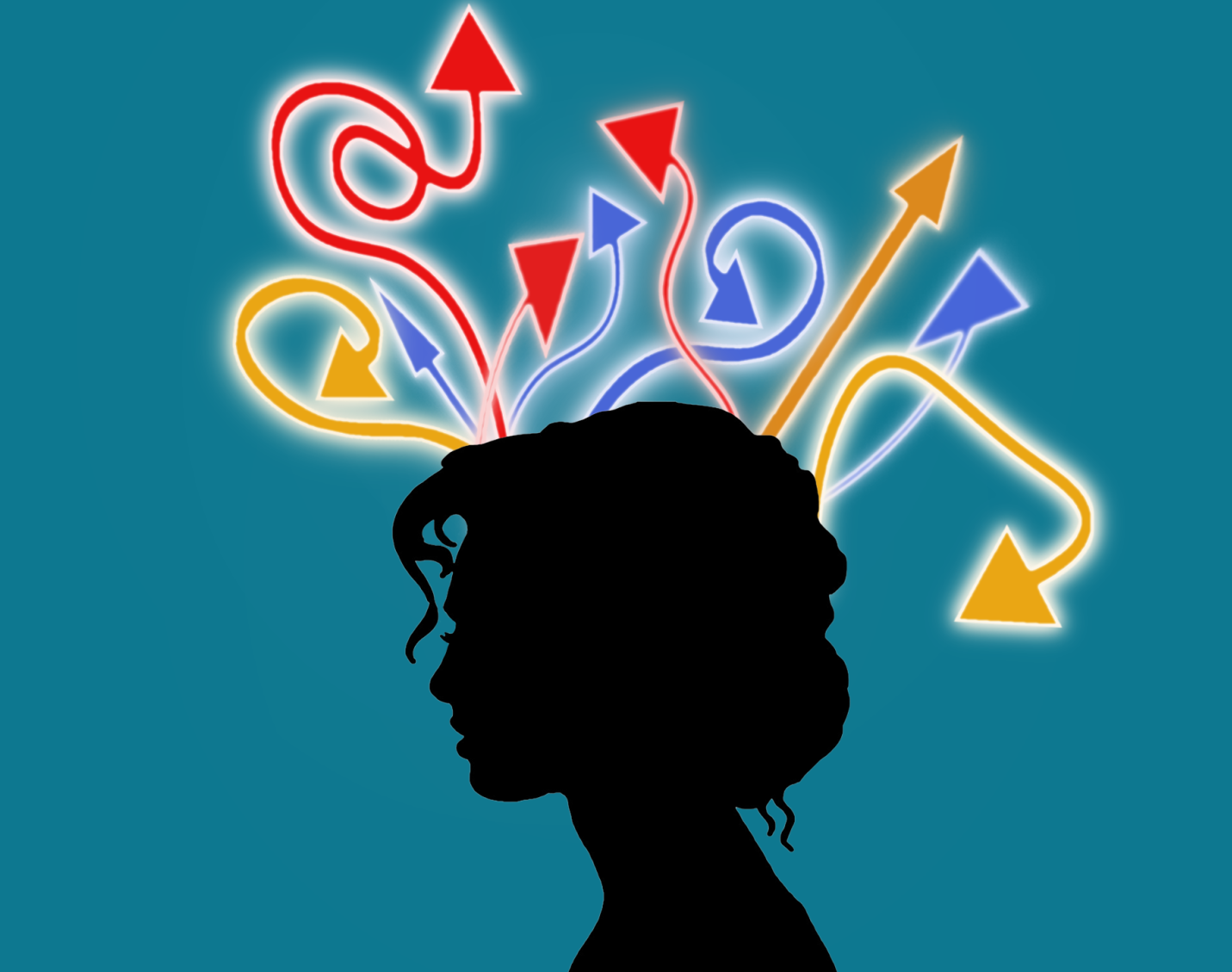Sophomore Maria Mungia has lived her entire life with ADHD. Early on, teachers had noticed her inability to focus, and they were concerned. As per the recommendation of her elementary school, was tested for and diagnosed with the disorder at the age of five.
“My mom got me tested because the school told her I wasn’t like the others,” Mungia said. “They said I had too much energy and couldn’t sit still and that I had all the normal symptoms of ADHD. So they told her to get me tested to see if it was that or it was something else.”
Attention-deficit/hyperactivity disorder, more commonly known as ADHD, is a neurodevelopmental disorder that’s most common in children and lasts throughout adulthood.
According to the CDC, the Centers for Disease Control and Prevention, six million people across the United States have been diagnosed with ADHD from the years 2016 to 2019.
Some symptoms associated with this condition are anxiety, depression, the inability to focus, a surplus amount of energy, hyperactivity and impulsivity. Mungia in particular experiences hyperactivity, impulsivity, inattention and anxiety.
Mungia strives to provide a much more personal view of her condition.
The struggle to maintain her energy and direct her focus arose long before she was diagnosed. As she began elementary school, the time when children begin to apprehend their reading and writing skills, she found it difficult to sit in her seat and focus on her work because of the amount of energy she possessed.
“I was really energetic and it was hard for me to sit still for a while,” she said. “I had to be trained. Especially when you’re in elementary school, that’s when you really start learning and I wasn’t really into it because it was hard for me to focus and do the work.”
Though most children at that age possess a tangible amount of energy, Mungia still felt different from her peers. The fact that kids are energetic doesn’t ultimately translate to them having ADHD. ADHD is more than just having a great amount of energy.
“Other kids could do their work and they could do things easily that I found hard to do,” she said. “It was hard for me to do daily tasks that other kids could do, like sitting in a chair or doing homework by themselves. It was difficult for both me and my mom because I wasn’t like the other kids.”
While getting tested did clear the confusion for both her parents and her teachers, the examination didn’t cure the condition. Mungia knew that she would have to deal with the feeling of being different forever.
“I felt outcast, because there were times that my energy did not match with other kids and they’d see me as weird but it was just me being myself,” she explained.
Mungia felt extremely unique, in all the bad senses of the word throughout her elementary and middle school years because of her ADHD. The condition was a part of her identity. She says that people hate the things that they don’t understand, and the kids her age definitely did not understand her condition.
“I had a type of energy and enthusiasm that other kids didn’t have, and when I would let that out they’d call me weird or wouldn’t want to be friends with me because I talked too much,” she said.
Despite the challenges Mungia faced, she got through her elementary school years as well as she could. But a new challenge was waiting around the corner: online learning.
Toward the end of her sixth-grade year, the pandemic forced Mungia’s middle school into distance learning.
Many teenagers favored online learning because they were given freedom they never had when sitting in a classroom being supervised by a teacher. They could watch TV during class, eat anytime they wanted and wake up two minutes before their classes started.
“It was so hard because I would just leave my Zoom and I’d get distracted,” she said. “It was just harder for me to focus on my work. Either I googled it or I just didn’t do it, because no one was there to force me. It was pretty difficult for me to put my energy into homework or classwork.”
With Mungia’s condition, online learning was detrimental.
“It was difficult because there wasn’t really that one-on-one help,” she said. “I had to self-teach a lot of stuff and watch a lot of videos due to the lack of help.”
The challenges kept coming. Mungia recounts an event during her eighth-grade year when a student wouldn’t believe her about having ADHD. They felt that she did not embody the symptoms of the disorder.
“In one instance, someone didn’t believe me and went on Google to find ADHD symptoms and compared me to whatever Google said,” Mungia explained. “They told me that I clearly didn’t have the symptoms so I clearly didn’t have ADHD. They just kept assuming things about my life and condition.”
Nonetheless, Mungia emphasizes that she is comfortable in her skin and has come to terms with her identity. The words and actions of those who are ignorant on the topic rarely trouble her anymore.
“I told them that they weren’t a doctor and they didn’t know about these things and even then, they went on to call me fake and a liar,” she said. “So I finally let it go because I know myself and my reality, and they have the right to believe whatever they want.”
Mungia rarely tells people about her disorder because she feels as though people won’t understand what it truly means. She has always hated the stereotypes surrounding ADHD.
“Not a lot of people or teenagers know about the reality of ADHD, and most teenagers take it as a joke and regard it as a disability,” she said. “A lot of people think I’m disabled but I’m not. My brain works a little bit differently than others and it’s not that I can’t do things that everyone else can, it’s just that I just have a harder time. I don’t understand the same way others do, and I learn differently.”
She considers it harmful when people throw around the idea of having ADHD in a joking manner, even though they have never been diagnosed.
“If you don’t know what ADHD is, you shouldn’t be saying that random things are a symptom,” she explained. “ADHD is not just everybody that’s energetic or has a hard time focusing. When people first think about ADHD, they think about having a lot of energy but there’s more to it. You could just be an energetic person but that doesn’t equal having the disorder.”
According to Mungia, many people who claim to have ADHD don’t even know what the acronym means. She points out that while her experience with the disorder involved possessing a surplus amount of energy and a short attention span, ADHD does not solely revolve around being energetic or unable to focus.
ADHD can manifest in children in a multitude of ways. In contrast to the popular belief that all patients are hyperactive, some with ADHD tend to sit quietly, focused on something in their mind. Symptoms are usually unique to males and females. Male ADHD patients tend to have impulsive, hyperactive and externalized traits while females tend to have inattentive, internalized traits.
Mungia went on to say that people keep looking at ADHD through a narrow lens, but what they don’t realize is that millions of people struggle with the condition in a million different ways.
“It’s not just about energy,” Mungia said. “It is about emotion, mood swings and anger issues too. Everyone is different.”
Regardless of the issues she continues to face, Mungia has broken out of her shell now that she’s found effective outlets for her specific symptoms.
“I’ve been playing sports since around the time I was diagnosed because I needed a release for my energy,” she said. “I’ve learned to manage my energy better by doing sports, and I also have friends who actually care to deal with me.”
As she’s matured, Mungia has managed to understand and manage her disorder more efficiently. Her friends, who love and care for her, have been a big help in her journey of self-discovery.
“I’m happy that I’ve found good friends that understand me because I changed myself a lot when I was younger,” she said. “I always wanted to be in a certain friend group but I couldn’t because I didn’t fit in, so I would change myself and act a certain way so that I could be in that group. I would do whatever they told me to do so that I could fit in, but now all I have to do is be myself.”
Looking back on the days she felt most alone, a constant source of support in Mungia’s life was her mother.
“My mom has patience and she sought out the help that I needed because many people don’t get the help they need for numerous reasons,” she said. “My mom really helped a lot as she put me in programs where people guided and helped me in areas that I needed to improve. It was a handful to deal with my energy, because at the time my little brother was a baby so it was inconvenient to have me running around at home. She had me in a lot of sports to use up my energy so by the time I got home, I was knocked out.”
Looking to the future, Mungia understands that she can’t always rely on her mother, even though she appreciates everything she’s done and will continue to do for her.
“I have to learn to be responsible because I won’t have the help I have from my mom in the future,” she said. “I have to learn to be independent and live with my condition and to redirect my attention to the tasks that I’m doing without someone needing to tell me.”
To others battling ADHD, Mungia says the most important thing is to let someone in and never give up.
“Keep going and try to get help,” she said. “Don’t do it all on your own, because by sharing your situation, you find ways to cope using other people’s advice.”




